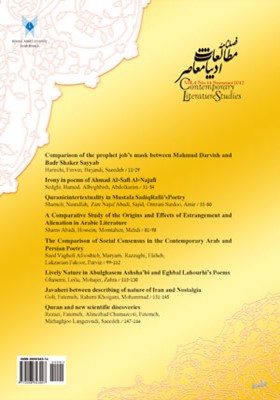A Comparative Study of the Origins and Effects of Estrangement and Alienation in Arabic Literature
Subject Areas : Contemporary Literature Studieshosein shams abadi 1 , mehdi momtahen 2 *
1 - دانشیار دانشگاه سبزوار
2 - دانشیار دانشگاه آزاد واحد جیرفت
Keywords: Influence, العصر الحدیث, الاغتراب, التأثیر والتأثر, الکلمات الدلیلیة: الأدب العربی, الغربة, التغریب, العصر الجاهلی, Arabic literature, estrangement, Alienation, Jahili period, modern period, Impression,
Abstract :
Abstract: Both estrangement and alienation press in certain mental and physical complications in man’s life and force him to experience mental deficiency, and feel a lack of positive communal or individual sense of belonging. However, the Jahili sense of these terms is quite different from their modern application. In the Jahili period, old age and senility are the main reasons for such inconveniences which would well reverberate all through a poet’s being and work. These poets, then, would treat their problems in peculiar ways. Some would surrender and some would violently push themselves and their poetic expression to extreme limits. Introversion and extroversion are the key moves assumed by either group. However, modern Arab writers, unlike their Jahili counterparts, experienced imperial and colonial hegemony since the beginning of the 17th century, and were introduced to extreme changes in life style and world views. This overwhelming alien influence has been remodeled in the form of a more repressing global force. The crushing mark of such influences has led to great waves of migration and self-denial among Muslim and Arab elites who have failed to reconcile themselves with a heritage and legacy once firmly established in the spirit of human life.

